The Dredge of Seventeen: July
By Mento 2 Comments
When it comes to game releases every year has its big headliners and hidden gems, but none were more packed than 2017. As my backlog-related project for this year I'm looking to build a list of a hundred great games that debuted at some point in 2017, making sure to hit all the important stops along the way. For more information and statistics on this project, be sure to check out this Intro blog.
This was not a productive month for much of anything given the humidity was so high there were moments of the day where it looked like an N64 game both inside and out the house. However, I did polish off Elex - one of those games, much like the PB RPGs that came before it, that I'm going to be a big apologist about for the rest of my days - and knock out two of the remaining mid-card Indies that I'd stacked up prior to the start of this year. We're not quite at scraping barrel territory yet (and gods willing, we'll hit December before that happens) but the 2017 content I have available is definitely thinning a bit. That's why August might have to be the month where I invoke the biggest GOTY contender I have left, so look forward to that.
Before then, though, we've got a trio of dubious contestants to process. What sort of final list placements await them? Read on...
Elex
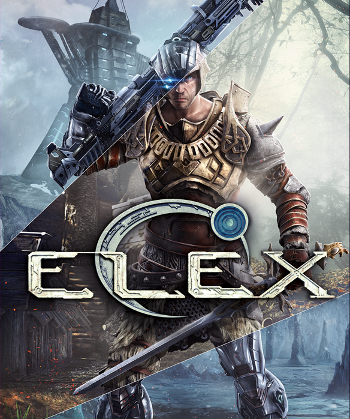
Last month proffered something of an aperitif on Elex, describing the manner of oblique backstory that allows it to be the bastard child of three completely disparate open-world RPG franchises (Skyrim, Fallout, and Destiny). For all its borrowing, I still think there's a kernel of an original idea behind the worldbuilding of Elex: that a ruined planet is suddenly filled with this unknowable alien element open to ruthless exploitation and experimentation that, as the finale of this game alludes to, is possibly even more dangerous than anyone realizes. It plays in the same speculative fiction pool as those with other similar eerie extra-terrestrial blue substances - The Expanse novels and TV show or the Metroid Prime trilogy coming to mind first and foremost - while also having fun with a Horizon-style post-apocalyptic setting filled with artifacts and mysteries of the "Old World" (which, to reiterate, isn't modern day Earth but a close approximation called Magalan) for the curious to find and learn from, provided they can evade or eliminate the nearby beasties. It's easily the strongest aspect of Elex, along with that Bethesda open-world model where heading off in any direction is bound to offer an intoxicating mix of discovery and danger.
The rest of Elex is... well, mixed to not great, I suppose would be the frank way of putting it. We're still beholden to the Piranha Bytes formula for better and worse - in short, it's best to ally yourself with a faction ASAP because that's when the class system really opens up, not to mention access to better equipment including the exclusive higher armor tiers - and trying to play through most of the game's content without the benefits a faction offers can be a limiting (and highly challenging) route. Of course, picking a faction too soon also nullifies all the other "do these quests and maybe you can join us" pre-faction qualification missions and all their handy XP and monetary rewards. It is a structure that affords for multiple layers of risk vs. reward and continues to be Piranha Bytes' lasting legacy, which is why they're always coming up with new thematic formats to frame that same approach rather than risk anything fundamentally different.
Diplomatically speaking, the combat is trash, and in the same way it always has been in PB games. It's all real-time third-person business, with enemies auto locked-on as soon as they're close enough. Both melee and ranged attacks will do their best to automatically point themselves towards the locked-on enemy, though you do have to be facing the approximate right direction in both cases. Even so, the game has a very odd sense of what registers as a hit; some enemies in particular have much further reach than their attack animations would have you believe, or are able to close the gap between you and they at an alarming alacrity, often at too great a degree for a ranged weapon's auto-aim to compensate. Ranged attacks are powerful but become next to useless if the enemy is right up in your grill. Melee attacks, meanwhile, are a much more tense affair because you'll want to use the heavy swings for maximum damage - I suspect but don't know for sure that defense values are of the negation kind, where you have to surpass an enemy's defensive value before damage is applied, which means some stronger enemies won't take damage at all if your attack value is too low - and it's a crapshoot if a heavy attack can finish its animation before the enemy knocks you out of it with a faster strike. Heavy attacks also have a mild knockback effect, so you can usually, if you're lucky, chain a whole group of them together before your stamina bar drains. Given you need that stamina bar for evasive rolls also, you're never in a great position standing around like a dummy with the "no stamina" danger icon above your head as the enemy makes mincemeat out of you. I'm not saying the combat doesn't have depth, just that it can break bad so readily and there's so many enemies early on that can kill you in within seconds with their stats and speed. It also doesn't help that most enemies have a ranged attack in case you get the bright idea to jetpack away to "safety" and try sniping them: their ranged attacks can come just as fast and will often carry additional damage-over-time status effects like poison and fire.
You'll learn quickly, either through experimentation or being on the wrong end of them, that stunning and knock-back effects on weapons (especially explosives) are overpowered to the point of effectively breaking the combat system wide open: the rate of fire for a weapon that produces a knockback effect, like the flamethrower or plasma rifle (with the explosive ammo setting), is faster than the amount of time it takes for the enemy to recover. This means you can stun-lock any enemy in the game forever, provided you have the ammo to wear them down and there isn't another enemy around to distract you - though the rate of fire might even be fast enough to stun-lock two or three simultaneously. Elemental status effects like fire, energy, ice, and poison are additive rather than replacing a weapon's core physical damage, so any weapons that carry those traits tend to be almost twice as powerful. In some ways Elex feels like Bloodstained: Ritual of the Night in that there are multiple obvious and less-obvious routes alike towards completely blowing the game's difficulty curve to shit if you're so compelled, after too many deaths, to make things easier on yourself or simply cannot resist the temptation to disrupt the game's ungenerously calibrated difficulty curve. Given that, absent these boons, the game might be a little too on the challenging side with its iffy combat and the ease with which groups of enemies can quickly cut you down, choosing to "balance the scales" with stun-lock cheesing may eventually prove too enticing to dismiss.
The jetpack is a relatively small addition that makes the world of Magalan far more enjoyable to explore, because it greatly expands your traversal capabilities. Anyone who spent any time "mountain jamming" in Skyrim knows the difference even a small traversal QoL improvement can make. The jetpack operates exactly how you'd think: hitting the jump button while in mid-air causes you to take off in either a long sustained boost (good for gaining height quick) or shorter bursts (good for crossing wide gaps) depending on whether you hold the button down or feather it. This "jump" button is also contextual: normally it makes you do a useless little hop without the second tap to activate the jetpack, but when the prompt appears it will also let you climb up ledges of a certain height (around five to ten feet tall). The jetpack automatically refills when not in use, though there's some nuance to how its fuel gauge works: there's a blue segment of the bar that regenerates quickly, and a small red zone that can be used for an extra little boost when needed that causes the bar to regenerate much more slowly. Ideally, you want to stop at the red zone to recover quickly for the next boost, but there'll be times when you need to give it a little extra juice to get to where you're going. It's also invaluable when leaping off high vantage points, since you can hit the thrusters just before landing to avoid all falling damage. The jetpack's not always the most controllable gizmo - it's very easy to overcorrect if you're attempting to land on a narrow strip of solid ground, like trying to ascend a creaking energy pylon via some small ledges - but it makes exploration of Elex's cracked and crumbling world so much easier to navigate. Better yet, the locations of Elex's more well-hidden loot were determined with the jetpack in mind, so the designers were free to play around with verticality when coming up with hiding spot ideas; thankfully, there's an accessory that helpfully highlights items in the vicinity if you're really struggling with the more elusive goodies.
A half-tip/half-criticism of Elex, which applies to many previous PB games, is that the economy isn't something that becomes an afterthought halfway through the game like it can be in so many other RPGs. While you can forgo buying new weapons for those found strewn about the environment, you'll need money for a great many things: buying new armor (in particular, faction armor, since you don't find that out in the wild); buying recovery potions; and buying new skills from trainers. The last of those is how you acquire new abilities: you're afforded a building point every level, but you have to actively seek out trainers to spend those points and each skill also has certain stat requirements to meet in addition to the training costs. Stats, conversely, don't actually do anything besides allow you to qualify for higher-tier skills: you gain a set amount of HP per level, and there's no encumbrance to make use of the strength stat nor are damage and to-hit values based on stats (the former is purely from whatever weapons you have and skills that modify damage, while the latter isn't applicable in an action RPG like this). Thus, when you spend your attribute points per level, it has to be in service to a skill you're aiming to acquire: to max out all three tiers of the Ranged Attack damage bonus skill, for instance, you'll need a Dexterity value of 85. Skills have a huge range of utility from boosting XP (not as valuable as they seem) to unlocking new active abilities during combat to new spells to lockpicking chests to hacking electronic safes to opening up new dialogue options. There's a skill that reveals enemies on the mini-map radar to avoid ambushes, one that lets you haggle for discounts, one that boosts the attack strength of your companions (or your own if alone), and at least four that allow you to craft items at workbenches. You do kinda need to do a little research to figure out which ones you want and then concoct a plan of action for when and where to spend attribute points to qualify for the most pressing skills as soon as possible. My advice? Get all the animal trophy-taking skills as early as you can, because you're going to need every extra shard of currency they'll bring you.
For all its faults, Elex captured my attention for damn near a month and part of that fascination is due to how it's a game that - at least initially, before you understand anything - is extremely punishing and makes you earn every little victory you can eke out. If you stumbled into a high-level enemy area and still somehow survived with a handful of salvage, there's something rewarding about that even if the salvage ends up being relatively worthless. Finding a powerful weapon and pouring your building points into your stats so that you might one day be able to use it is one of many exercises in delayed gratification that the game can offer, along with returning to said high-level areas fully loaded to bear and wiping out what once gave you so much trouble. Exploration is a no-fuss dream because there's no item limits or encumbrance to hold you back so your forays into the wilderness last as long as you have potions and health to spare, and if you decide to tap out there's unlockable fast travel points to warp to anywhere of note. The map likes to break early and often but will at least keep track of trainers and vendors if you need to drop a waypoint on their heads, and its Google Maps view of the world always gives you some idea of where off the beaten path there's another crumbling wreck of some ancient condo or an abandoned factory ripe for the plucking if not an idea of whether or not there's something big and scary lurking within.
Elex is as compelling and as frequently frustrating as any given Bethesda game, albeit with a lower quality of writing and even more bugs and memory leak issues typical of the Eurojank market, but the biggest and most important distinction is that it doesn't adjust itself constantly to suit your power level: rather, it's a harsh, unfair, and decidedly lethal world that you have to tame gradually, with every small advantage you're able to claim for yourself making that much more of a difference. Elex still has many of the same open world RPG quality-of-life touches you've grown accustomed to in other contemporaries of the genre, but it is not a game that holds your hand at any step of the way and its hostility might prove to be a dealbreaker for the less patient among you. For the rest, you might come to understand - if you aren't already there - how Piranha Bytes has managed to carve out a respectable little niche for itself despite making the same game over and over for at least twenty years.
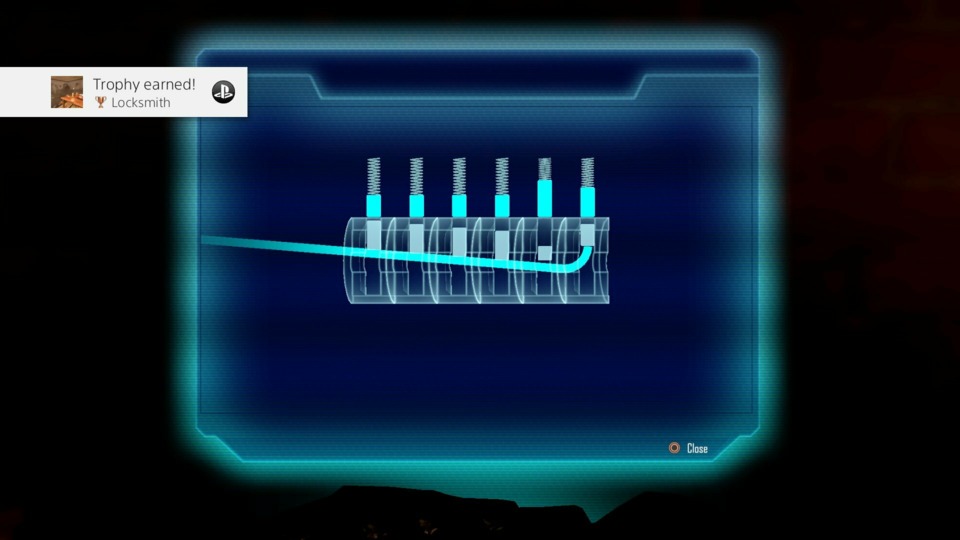
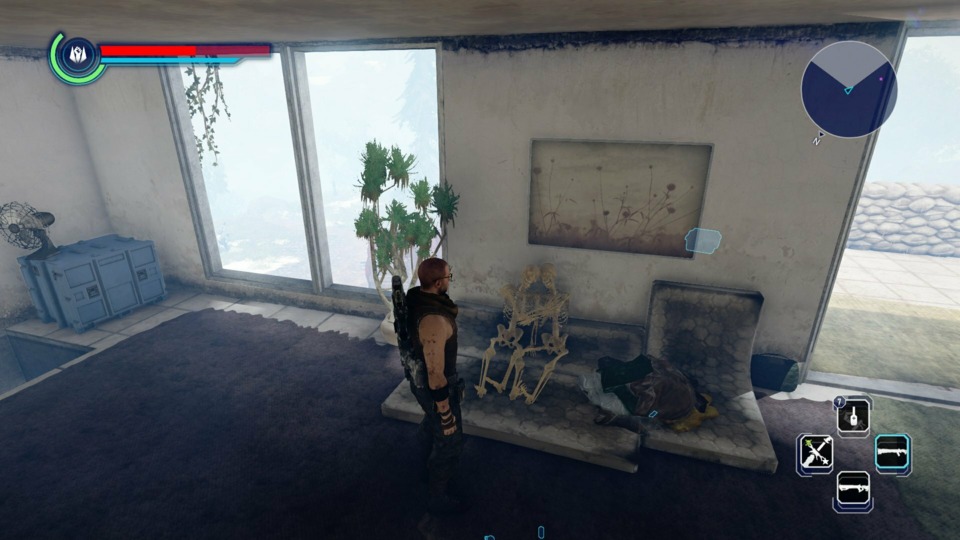
Ranking: C. (I'll give it props for its ambition, its respect for you as a veteran RPG player, its enigmatic sci-fi setting cobbled together from a whole bunch of sources, its decision to give sunglasses valuable properties thus ensuring that you're always wearing sunglasses in every cutscene, and its huge open world full of pre-apocalypse loot and curios to discover. There's no getting around its many flaws either, chiefly where its combat and relative lack of a budget are concerned, but Piranha Bytes has this charming moxie powering its decades-long quest to recapture Gothic's success with that same formula in slicker and more modern contexts.)
Giga Wrecker
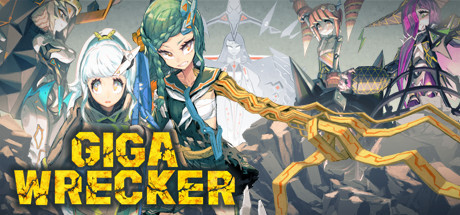
It definitely felt too good to be true - a 2D explormer by Game Freak? With the talent and resources at their disposal? - and my time with Giga Wrecker was at times a sobering one, though there's perhaps enough soul in here to have been retroactively worth the time investment.
Set in the near-future where human civilization has been devastated by an invasion of odd-looking robots named "Ajeet" an imprisoned human survivor named Reika is suddenly broken out of her jail cell by a mysterious young woman. However, this is soon followed by a hurried assassination attempt after the rescuer is spotted and quickly captured by the Ajeet. The dying Reika is later found by a human scientist and is brought back to life by merging her with Ajeet technology, turning her into a cyborg. This new form carries all the advantages of the Ajeet's overwhelming power: most of it is nanotechology-based, allowing Reika to use her cybernetic arm to turn nearby detritus into tools and powerful weaponry. It also allows her to infiltrate the Ajeet's compounds, since she registers as another Ajeet on their surveillance. This gives Reika the opportunity of destroying each Ajeet base of operations to save what remains of the human race.
Reika's nanomachine powers, named ARCHE, are heavily involved in the game's puzzle-platformer format, since they're capable of molding the destructible elements of the landscape in such a way to make progress possible. This might involve cutting off a chunk of rock with a sword to let it fall over a pit as a bridge, tossing a javelin into a wall to use as a foothold, or creating a big trash cube as a step up to a higher platform or a weight to hold down a switch. Giga Wrecker is also heavily physics-based, as these various detached rocks and other debris follow a not-particularly-intuitive set of rules behind their behavior once free of their bindings, along with other environmental effects like toxic gas clouds (which float up and can even lift objects placed on top). As is often the case with mechanics like these, they're very unpredictable and it can be hard to cajole them in such the right way to create the desired effect, but alternative solutions will often arise simply from messing around in the hopes it'll shake out right in a wholly serendipitous manner.
Reika's four abilities are doled out at set intervals and are usually if not always required for the puzzle rooms to follow, but she can also gather nano crystals from the terrain, from fallen enemies, or from special converters that can be spent on a skill tree to enhance her abilities in subtle, non-essential ways. These skill tree enhancements might include increasing her maximum health, increasing the window of invincibility after getting hit, adding new qualities to her extant abilities to make them more useful in combat, or increasing the rate at which she regenerates health (vital for the tougher bosses).
Giga Wrecker's presentation is... surprisingly mixed, given Game Freak's pedigree. For instance, the music is generally excellent and the art design is vivid and colorful while still retaining a certain visual clarity for what you can interact with in any given scenario. Likewise, the camera will helpfully zoom out in larger environments to give you a sense of all the moving parts you have to work with. However, the localization is really spotty - it's even more error-prone than most SNES JRPGs - and I had erratic framerate issues almost the entire time, given the massive variations in the size and complexity of the puzzle rooms. The story goes from making little sense to practically zero once time-travel becomes a factor; the heroine frequently bouncing backwards in time to undo tragic events though somehow leaving all the previous puzzle rooms solved, and the way characters suddenly become cognizant of the time alterations is never really given an explanation beyond the sake of plot contrivance. The sheer frustration caused by the unpredictable nature of the physics puzzles is the game's worst aspect, but there's a certain ramshackle budget Indie nature to the whole game that feels at odds with its source.
I realize Game Freak has been poking their head out of the Pokémon labs every now and again for what I imagine are "refresher" projects - games where they don't have to think about Pikachu every five minutes - and that they've been wildly inconsistent: i.e. for every HarmoKnight there's a Little Town Hero. It's still perplexing why they couldn't devote more effort to these games to get them anywhere near as slick as the Pokémon franchise. Maybe they're like trial runs for new employees before they're allowed anywhere near pokéballs and gyms? Perplexing.
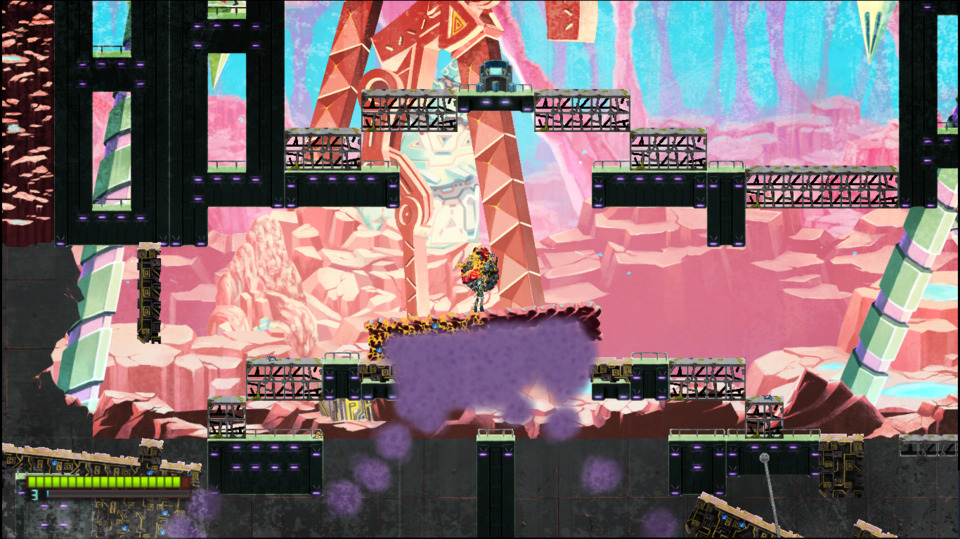
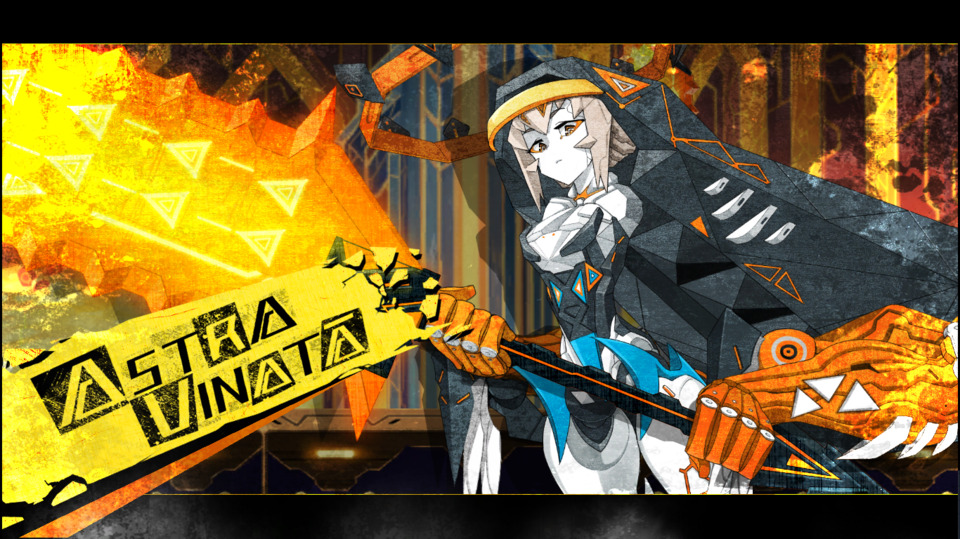
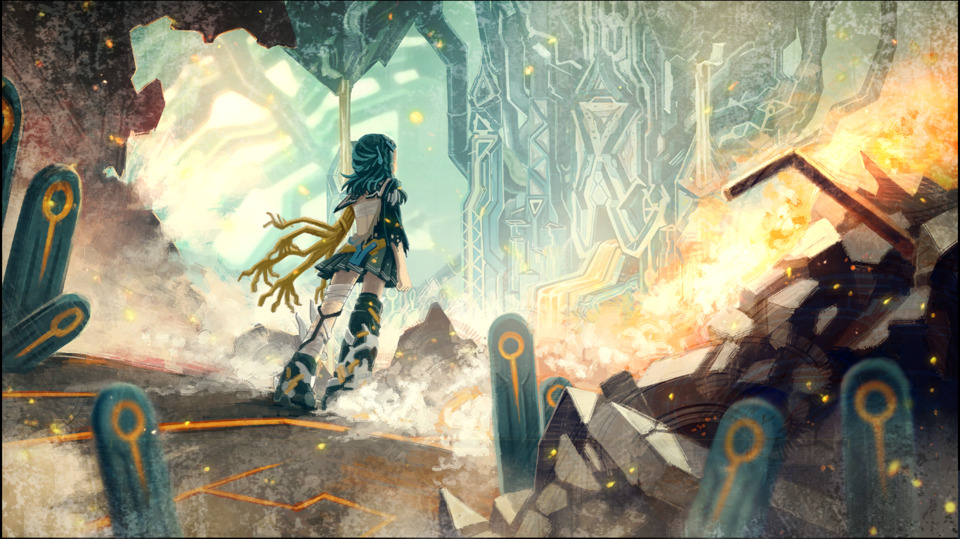
Ranking: D. (Stylistically there's a lot going for Giga Wrecker and it's sort of surprising to see a major Japanese studio jump on the physics-based Indie puzzle-platformer train, but - much like its puzzles once I'm done with them - it all feels hastily thrown together and, if it works at all, it's only through wishes and dreams.)
Old Man's Journey

As has become my usual tactic for this feature, I managed to squeeze in a short, narrative-focused game at the end of the month for a little bit of additional flair. Old Man's Journey is a dialogue-free game about, well, an old man that goes on a journey. It's purposefully cagey about the old man's destination and the purpose for his trek, though the moments where he rests allows him (and the player) to revisit memories of his youth as a rough and tumble sailor bewitched by an attractive redhead and opting to settle down with her. The twists and turns of these backstory snippets eventually hint towards the end goal of this rambling, hirsute gentleman as he strides and rides all manner of vehicles to reach this final location.
The player's role in this odyssey is to help the old man reach the next stage of his travels by changing the elevation of the nearby rolling hills and landscapes. The player can raise or lower several "layers" of hills going from the background to the foreground, and once they connect (there's a circular indication to make it clear) the old man can hop from one to the next. Sometimes you'll want to move the old man to a side area so you can shift the hill he was just standing on, and you'll eventually have to interact with other elements to clear a path: nudging a small herd of sheep to another grazing spot, for instance, or rolling heavy metal wheels down slopes to crash through walls and make a route through. Even when the old man boards a train, the player is required to quickly move hills and bridges to connect the railway (though there's no actual rush as the train will come to a stop and patiently wait for you to fix the route). At set intervals, the old man will stop at a bench and take a breather to collect himself, which often leads to a reminiscence and the next segment of the journey. If there's an issue with this format, it can sometimes be a little awkward to line up the contours of each hill so they fit snugly enough for the old man to want to cross them, with some seemingly arbitrary limitations placed on how high or low you can move certain bluffs and slopes, but no single instance is all that difficult to ascertain and at worst it's a few moments of trial and error.
As expected from the Indie set, the old man's story is both bittersweet and earnestly told. There's tragedy mixed in with élan, of regrets and missed opportunities, and there's the knowledge that whatever was in the letter that spurred this journey, it's not necessarily going to be a happy circumstance given the old man's reaction when he first reads it. Visually and musically, the game nails the emotive tones its going for and while it has a simple, cartoonish aesthetic it does not always exhibit a chirpy mood. That said, the game also has a mild sense of playfulness, as you can tap on various background objects for some amusing incidental animations similar to those in games produced by Amanita Design (Samorost, Botanicula). The memories, which are mostly static images of the old man's previous years as a less-old man, are frequently stunning with a great deal of detail.
The game overall should take about an hour to complete so it's certainly not a long journey, but it's the sort of lunchtime break-sized adventure that packs its small frame with plenty of adventure and charm and when one such game drops into my lap entirely for free - Old Man's Journey was part of the Racial Justice and Equality bundle, as befitting its empathetic nature - it's hard to say no to the small time investment it asks for.
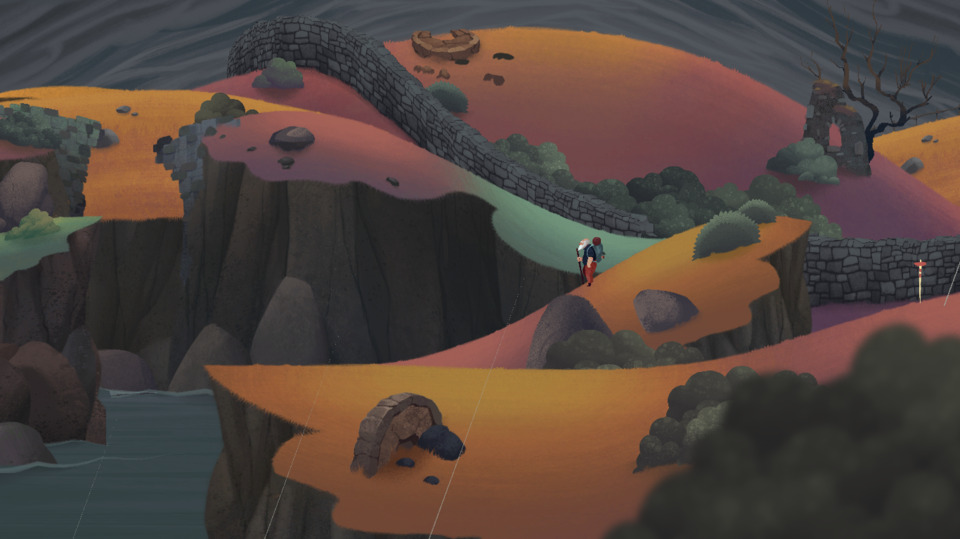

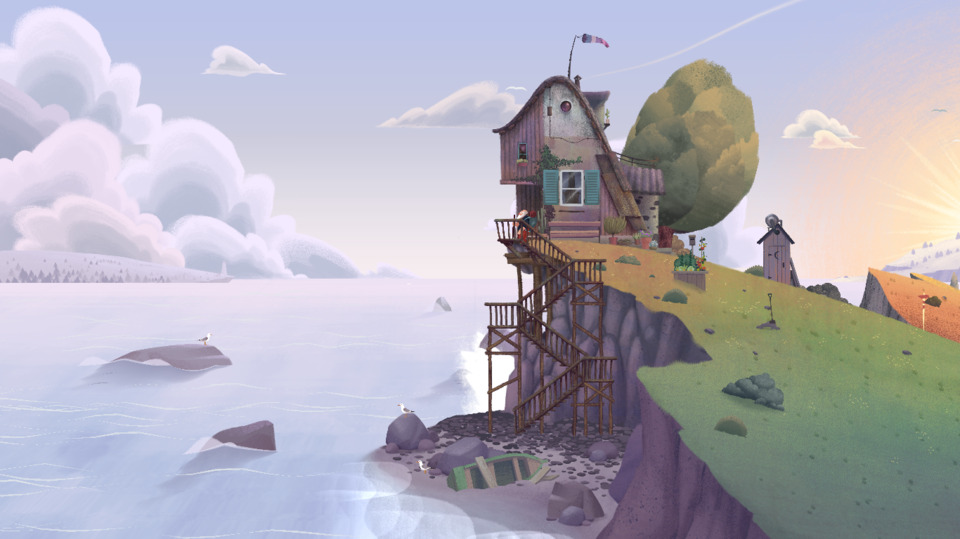
Ranking: C. (A more versed media critic can better cleverly pick apart the semiotics and themes of the old man's journey than I could here, but I'd rather keep this review short and sweet like the game itself. It's brief, not too tough, and while it doesn't reach the emotional peaks and valleys as something like Rakuen - another 2017 weepie - due to being dialogue-free, I still felt just the smallest pang of sympathy in my cold dead heart once it was over.)
